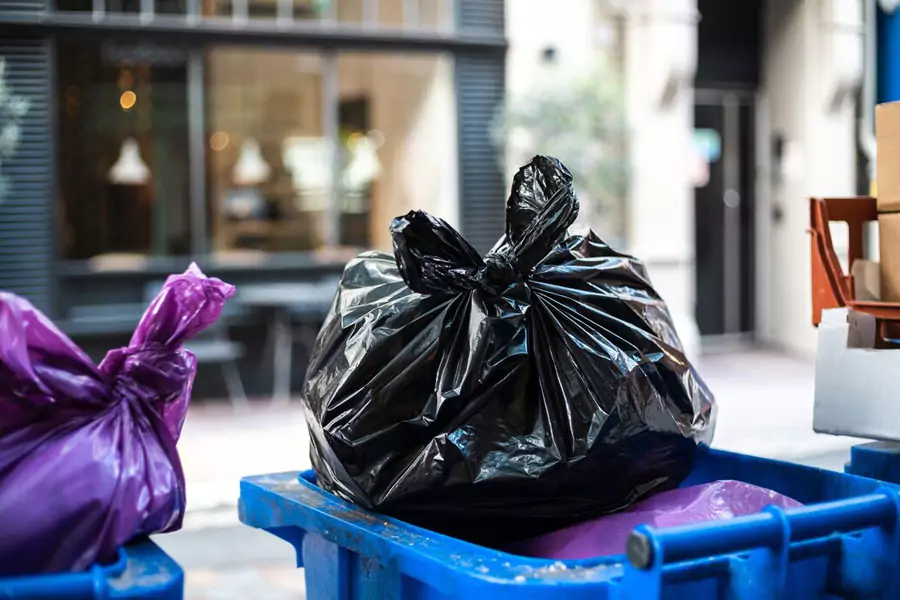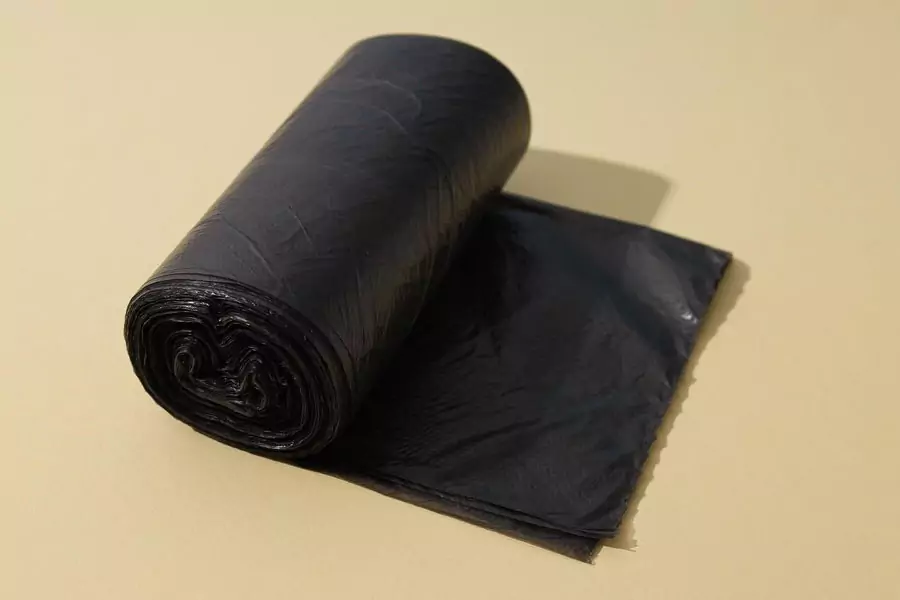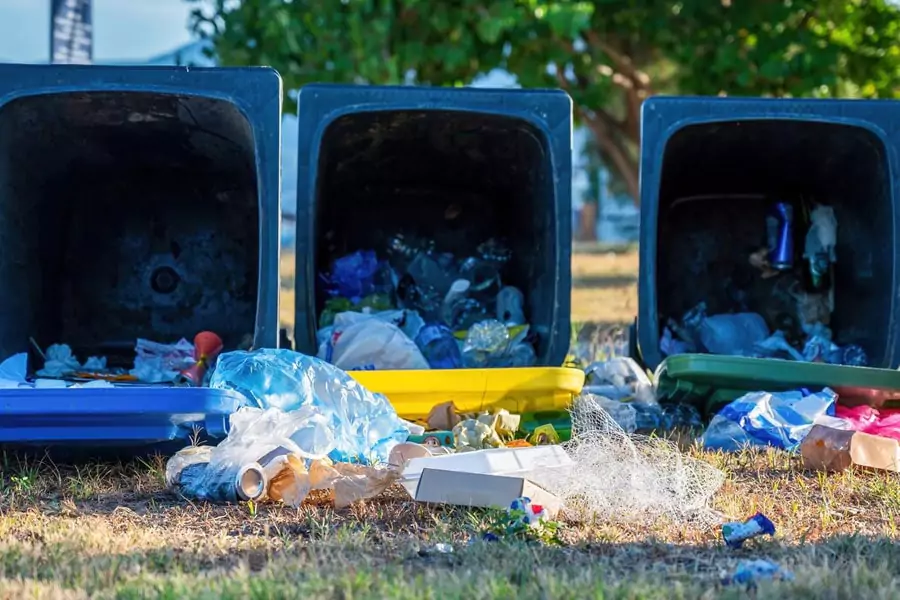
Can You Recycle Used Trash Bags and What You Need to Know?
Do you know that nearly 11 million tons of plastic, equivalent to dumping 2000 garbage trucks, enter the world’s oceans, rivers, and lakes every single day? Only 9% of the plastic ever produced has been recycled, and the rest has been burned, buried, or ended up polluting our environment. Plastic pollution produces catastrophic harm to the environment. Considering the alarming proportion of such ecological harm, reducing, recycling, and reusing trash bags are better ways to minimize the damage due to plastic pollution.
As a leading manufacturer of plastic shopping bags in the US, we are committed not only to supplying high-quality plastic bags but also to enlightening our customers on how to reduce their carbon footprint by recycling plastic bags and reusing them. Continue reading this blog, which clarifies whether trash bags can be recycled and provides helpful tips for proper disposal.

What Are Trash Bags Made Of?
Plastic trash bags are made of materials like High-density Polyethylene (HDPE) and Low-density polyethylene (LDPE). Some biodegradable plastics are made from cornstarch or plant-based polymers. Many people wonder whether plastic trash bags, like other plastic materials, can be recycled or not. The good news is that they can be recycled, but only in a specialized plastic film recycling firm equipped to handle the task. Whether you are in New Jersey, Chicago, or any part of the US, you can find a plastic film recycling firm near you on the internet. What’s more, many retailers and grocery stores provide drop-off facilities for plastic bags and plastic films that one can use to dispose of.
Why is Recycling Plastic Bags Complex?
Recycling of plastic bags is a more complex process than recycling of plastic bottles and containers. They are not recycled through the curbside recycling programs due to sorting complexity and mechanical issues. Thin trash bags are quite difficult to sort, and they easily jam the sorting machinery. They obstruct the recycling machinery, reducing their effectiveness and leading to potential breakdowns and safety hazards for workers. Besides, they can easily contaminate other recyclables. That is why most recycling facilities refuse plastic bags. You need to bag them separately and bring them to the specified drop-off locations, from where they are collected and taken to specialized recycling plants.
Common Misconceptions about Plastic Bags and Their Recycling
People have some myths or misconceptions about plastic bags.
Myth 1- All plastic bags are created equal.
Truth: – All plastic bags are not created equal. They come with varying properties, recyclability, and environmental impact depending on the type of material they are composed of. Some are made for single-use, while others can be used multiple times.
Myth-2 Plastic bags cannot be recycled.
Truth: – Plastic bags can be recycled as they are made of high-density polyethylene and low-density polyethylene, both recyclable materials. However, they need specialized equipment and processes.
Myth-3:- Soiled plastic bags are accepted for recycling
Truth: Soiled plastic bags, due to the contaminants like grease, food or water, are rejected and not considered fit for recycling as they can easily contaminate other plastic bags and recyclables.
Myth-4:- Recycling plastic waste is not worth it
Truth: Some people believe that recycling thin plastic bags is not worth the effort, as the time and resources used in recycling far outweigh the benefits. However, this is a wrong perception. Recycling of plastic bags minimizes the carbon footprint associated with new plastic production, reduces waste in landfills, and conserves resources.
Important Things to Know about Recycling Used Trash Bags
Plastic Bags Suitable for Drop-off Bins
Not all plastic bags are recyclable. You must know which kind of plastic bags are usually suitable to be recycled and put into drop-off bins. These are shopping bags, zipper-top food storage bags, bread bags, produce bags, plastic newspaper wrapping, bubble wrap, and plastic shipping envelopes. Before dropping into the recycle bins, you should ensure that all plastic bags are clean and dry without any labels, stickers or staples. They shouldn’t contain any food residue that may contaminate the entire batch.

Plastic Bags You Should Drop in the Trash
Crinkly plastic bags like chip bags, frozen food bags, candy bar wrappers and biodegradable bags need to go into the trash. These bags are less likely to be recyclable, and hence, you need to drop them in the trash.
Local Recycling Facility Doesn’t Accept Plastic Bags
You should know that most curbside bins don’t accept plastic bags as they don’t have the personnel and equipment to sort out, process, and recycle the plastic bags. Plastic bags can easily get entangled in the machinery and jam the equipment, leading to a sudden breakdown. The bags get snagged in belts and need to be cleared manually, which is time-consuming.
Even if some communities accept plastic bags in their curbside collection, they require residents to clean and dry all the bags, remove all labels and put them all in one recyclable bag tied at the top, which makes it easy for recycling workers to pick the bag out and send it to the specialized facility for recycling.
Other locations may accept plastic bags only in their drop-off facility, where the resident should clean these plastic bags, dry them and keep all of them in one bag.
Never Bag Your Recyclables in a Plastic Bag
You should always remember that when you are putting recyclables in a curbside collection, they should be loose in the bin. You should be using a transparent recycling bag to drop off the recyclables if the bin is overflowing, but avoid putting shopping bags filled with recyclables in the bin.
Consider Reusing Plastic Bags or Other Eco-friendly Alternatives
You can consider reusing plastic bags for lining smaller waste baskets, packing materials for fragile items, making jump ropes, or storing other materials. It will extend the life of a single-use product. You can use other eco-friendly alternatives like paper bags, reusable cloth bags, or compostable bags.
The Takeaway
Plastic bags are ubiquitous and the most convenient way to store and carry materials. However, as they are non-biodegradable, they pollute our soil and marine life. The breakdown of plastic bags into micro- and nano-particles and their entry into the food chain system further aggravates the problem. Recycling plastic trash bags, reusing and reducing their usage are the best ways to curb their ecological impact.
So, if you want to reduce your carbon footprint and contribute your best to save the earth, you should make changes in the way you handle your waste. So next time you tie up your garbage, think twice before tossing that bag in the recycling bin.
